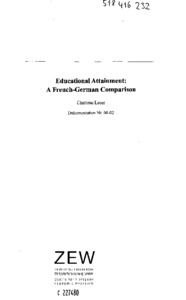|
Educational attainment : a French-German comparison
Lauer, Charlotte
![[img]](https://madoc.bib.uni-mannheim.de/43246/1.hassmallThumbnailVersion/dokumentation0102.pdf)  Vorschau |
|
PDF
dokumentation0102.pdf
- Veröffentlichte Version
Download (4MB)
|
|
URL:
|
https://ub-madoc.bib.uni-mannheim.de/43246
|
|
URN:
|
urn:nbn:de:bsz:180-madoc-432461
|
|
Dokumenttyp:
|
Arbeitspapier
|
|
Erscheinungsjahr:
|
2001
|
|
Titel einer Zeitschrift oder einer Reihe:
|
ZEW-Dokumentation
|
|
Band/Volume:
|
01-02
|
|
Ort der Veröffentlichung:
|
Mannheim
|
|
Verlag:
|
ZEW
|
|
ISSN:
|
1611-681X
|
|
Sprache der Veröffentlichung:
|
Deutsch
|
|
Einrichtung:
|
Sonstige Einrichtungen > ZEW - Leibniz-Zentrum für Europäische Wirtschaftsforschung
|
|
MADOC-Schriftenreihe:
|
Veröffentlichungen des ZEW (Leibniz-Zentrum für Europäische Wirtschaftsforschung) > ZEW-Dokumentation
|
|
Fachgebiet:
|
330 Wirtschaft
|
|
Abstract:
|
This documentation analyses the structure of educational attainment in France and Germany. While France and Germany share in many respects similar socio-economic structures, they sharply differ with respect to their educational system. First, the three-tiered secondary school system in Germany, where pupils are streamed after primary schooling according to their learning ability into different secondary schools, contrasts with the situation in France, where all pupils attend a single structure up to upper secondary level. Moreover, in France, general education is more prized than vocational education. The French maturity certificate, has a key position in the educational system, while vocational education tends to be reserved to those pupils who have failed on the way to maturity completion. By contrast, the German education system is strongly oriented towards vocational training and the apprenticeship has a central position. At the higher education level, a relatively homogenous system in Germany can be opposed to a much more differentiated landscape in France, both in terms of types of institutions and of gradation of educational credentials. These differences have repercussions on the distribution of educational attainment in both countries. With the help of a comparative typology of educational credentials established in this documentation, empirical evidence on the distribution of educational attainment in France and Germany could be gathered from representative data sets. A striking feature is the stronger dispersion of educational attainment in France compared to Germany. This is obvious at the secondary level, where more French than German people do not have any school degree at, while more French people hold the general maturity certificate, but also in terms of final educational attainment. Thus, more French than German people do not hold any vocational degree, but there are also more higher education graduates in France, while the distribution of educational attainment in Germany is concentrated around basic and intermediate vocational qualifications. There has been in both countries a substantial upgrading of the qualification structure since the mid-1980s, but the expansion has been stronger in France, especially among women. Gender differences are more pronounced in Germany. French women do better at school than French men, and they have increased their comparative advantage, particulary with respect to maturity certificates. In Germany also, women have improved their position compared to men, but this expresses in a strong progression of intermediate school certificates, while men have conserved their advantage in terms of maturity certificates. In terms of final educational attainment, however, men do better than women in both countries, but the gender gap is much more pronounced in Germany, particularly at the higher education level. In both countries, women have improved their position compared to men since the mid-1980s, but the expansion has been stronger in France, and in Germany, it was limited to qualifications below tertiary level.
|
 | Das Dokument wird vom Publikationsserver der Universitätsbibliothek Mannheim bereitgestellt. |
 Suche Autoren in Suche Autoren in
Sie haben einen Fehler gefunden? Teilen Sie uns Ihren Korrekturwunsch bitte hier mit: E-Mail
Actions (login required)
 |
Eintrag anzeigen |
|
|
